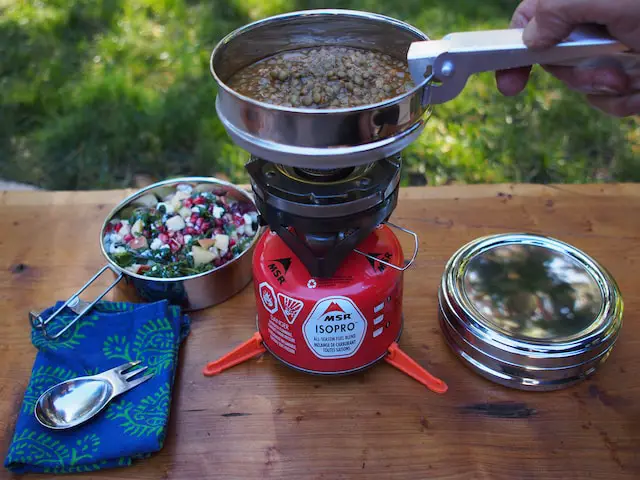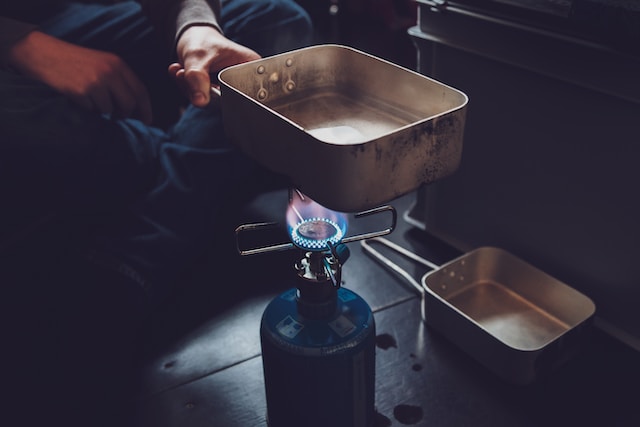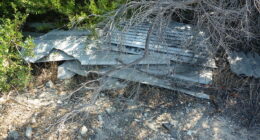Butane is commonly used for portable heaters, camping stoves, and lighters due to its lower boiling point, propane is often preferred for grilling, heating homes and buildings, powering vehicles and appliances due to its higher energy content.
What is butane?
(Photo by Sandra Harris on Unsplash )

Butane is a highly flammable gas that is commonly used in portable devices such as camping stoves, lighters, and torches. It’s a colorless and odorless gas that can be compressed into liquid form for easy storage and transport. Butane has four carbon atoms in its chemical structure, making it an alkane hydrocarbon.
One of the characteristics of butane is its low boiling point which means it turns from a liquid to gas quickly when exposed to room temperature or heat. This makes it ideal for use in lighter fuel because it ignites easily with just a spark.
In addition to being used as fuel for outdoor activities like camping or hiking, butane is also utilized by industries such as agriculture and manufacturing. In these fields, butane acts as an aerosol propellant in insecticides and pesticides products or refrigerant applications due to its low boiling point.
However, despite its many uses, there are also some downsides associated with butane usage. For example, inhaling too much butane can cause dizziness or even death due to oxygen deprivation.
Understanding the properties of butane is crucial when using this substance safely and efficiently both at home or work environments.
What is propane?
(Photo by Joshua Sukoff on Unsplash )

Propane is a colorless and odorless flammable gas that is widely used as fuel. It belongs to the family of liquefied petroleum gases (LPGs) which also includes butane, methane, and ethane. Propane is derived from natural gas processing and petroleum refining.
One of the key features of propane is its high energy content compared to other fuels. It burns hotter and more efficiently than most other fossil fuels making it an ideal source for heating homes or commercial buildings. It’s also commonly used in cooking appliances like grills, stoves, and ovens.
Another advantage of propane is its portability which makes it easy to transport over long distances without losing its chemical properties. This has made it a popular choice for off-grid living where access to conventional power sources may be limited.
However, despite all these advantages, there are some safety concerns associated with handling propane due to its highly combustible nature. Therefore proper storage and handling guidelines must always be followed when using this fuel.
Propane has been proven to be a reliable source of energy with many benefits when used appropriately under strict guidelines by experts in the field.
Butane Vs. Propane – Key differences
Butane and propane are both gases commonly used as fuel sources in many households. However, they have different chemical structures that result in distinct differences between them.
One of the key differences between butane and propane is their boiling points. Butane has a lower boiling point than propane, which means it vaporizes at a faster rate when exposed to heat. Propane, on the other hand, has a higher boiling point and takes longer to vaporize.
Another major difference is their energy density. Propane contains more energy per unit volume than butane, making it ideal for high-energy applications such as heating homes or powering vehicles. Butane’s lower energy density makes it better suited for smaller-scale uses like lighting stoves or camping lanterns.
The two gases also differ in terms of availability and cost. Propane is generally more widely available and less expensive compared to butane due to its higher demand for industrial use.
While both butane and propane are useful fuels with their own unique advantages, understanding the key differences between these two gases will help you choose the right one based on your specific needs.
The uses for butane and propane
Butane and propane are both popular choices for fuel in various applications. Propane is commonly used as a heating source for homes, grills, and camping stoves. It’s also used as a refrigerant and in industrial processes like welding. Butane, on the other hand, has a lower boiling point than propane and is often used in portable devices such as lighters, torches, and camp stoves.
Butane is preferred over propane when it comes to indoor use because it burns cleaner with less odor compared to propane. This makes it perfect for use in small or confined spaces such as tents during camping trips or inside cooking areas at home.
Propane can be found almost anywhere; from barbecue grills to RVs to backup generators that require a large amount of power. One of its primary advantages is that it produces more heat per unit volume compared to butane which makes it ideal for outdoor activities where you need quick access to high heat.
Both fuels have their unique uses and benefits depending on what you’re looking for. Whether you’re using butane or propane will depend on your needs – whether indoors or outdoors – so make sure you choose accordingly!
How to store butane and propane
Storing butane and propane properly is crucial for ensuring your safety and the longevity of your gas supply. Here are some tips:
- Always store butane and propane tanks in a cool, dry place away from direct sunlight or any sources of heat.
- Keep the tanks in an upright position to prevent leaks or potential hazards.
- Avoid storing large quantities of gas indoors as it can be a fire hazard, always try to keep them outside.
- Store the gas cylinders separately from other flammable materials such as chemicals, solvents, and oil-based products.
- Use protective covers or cages to shield the tanks from accidental damage that could cause leaks or ruptures.
- Make sure there’s proper ventilation where you’re storing your gas cylinders as gases like propane are heavier than air so they will settle low on the ground level if they were released into a room
By following these simple guidelines for storing butane and propane safely, you can ensure that you have reliable fuel when you need it while keeping yourself and others safe from harm!
Can I use butane instead of propane?
Butane and propane are often used interchangeably, but can one be substituted for the other? While both gases are odorless, colorless, and highly flammable hydrocarbons commonly used as fuel for heating or cooking appliances, there is a significant difference in their properties.
Propane has a lower boiling point than butane which means that it vaporizes more quickly. This property makes propane an ideal choice for outdoor activities such as camping, grilling or heating large spaces. Butane on the other hand performs better at low temperatures making it suitable for indoor use.
It’s important to note that using butane instead of propane could result in inefficient appliance performance or damage to your appliance. This is because most appliances are specifically designed to work with one type of gas only.
Additionally, you need to check the pressure ratings on your device before attempting any kind of substitution between these two gases. Using either gas outside its intended pressure range can lead to leaks and pose safety hazards.
While they may seem similar at first glance – butane and propane have distinct differences that make them suitable for different applications. As such it’s always safe to follow manufacturer recommendations when choosing between them
The advantages and disadvantages of butane
Butane is a popular alternative to propane in many applications. One of the advantages of butane over propane is that it has a lower boiling point, which makes it easier to ignite and use as fuel. It also burns cleaner than propane, producing less soot and carbon monoxide.
Another advantage of butane is that it can be stored for longer periods without degrading or becoming explosive. This makes it an ideal choice for portable stoves, camping equipment, and other outdoor activities where space and weight are at a premium.
However, there are also some disadvantages to using butane. For one thing, it has a lower heat output than propane, which means that cooking times may be longer when using butane gas appliances. Additionally, due to its low pressure rating compared to propane gas cylinders, butane cannot be used in larger appliances such as home heating systems.
While butane may be safer than propane in certain circumstances due to its lower volatility level – particularly when used outdoors – users must still take care not to expose themselves or others nearby through accidental ignition sources like open flames or sparks from electrical devices.
Though despite these drawbacks mentioned above Butane can still serve as an excellent source of fuel depending on the intended application!
The advantages and disadvantages of propane
Propane is a highly versatile and efficient fuel source that has become increasingly popular in recent years. Here are some of the advantages and disadvantages of using propane.
Advantages:
- High energy content: Propane has a higher energy content than natural gas, which means it can provide more heat for the same amount of fuel.
- Cost-effective: Propane is generally less expensive than electricity or heating oil, making it an attractive option for homeowners looking to save money on their energy bills.
- Environmentally friendly: Propane produces fewer greenhouse gas emissions than other fossil fuels like coal and oil, making it a cleaner alternative.
- Portable: Propane tanks are easy to transport and can be used in remote locations where other fuel sources may not be available.
Disadvantages:
- Flammable: Like all combustible fuels, propane poses a fire risk if handled improperly or stored incorrectly.
- Carbon monoxide risk: While propane itself does not produce carbon monoxide, improper combustion can lead to the production of this deadly gas.
- Limited availability: In some areas, propane may not be readily available or may be prohibitively expensive due to transportation costs.
- Tank maintenance required – Tanks need regular inspections by professionals.
While there are some risks associated with using propane as a fuel source, its many benefits make it an appealing choice for homeowners looking for an affordable and environmentally friendly way to heat their homes or power their appliances.









